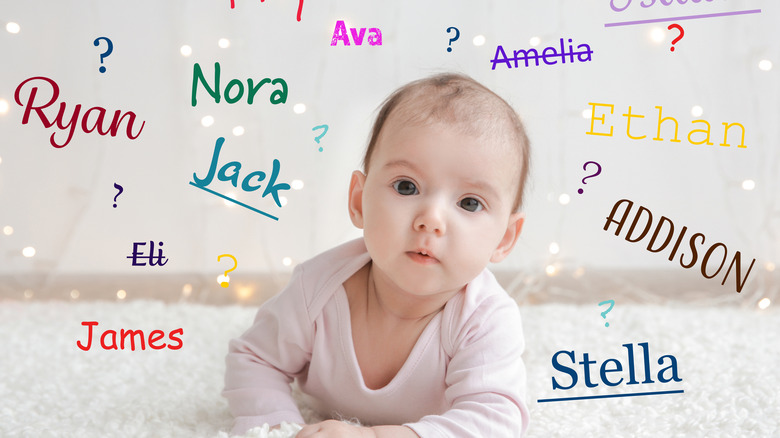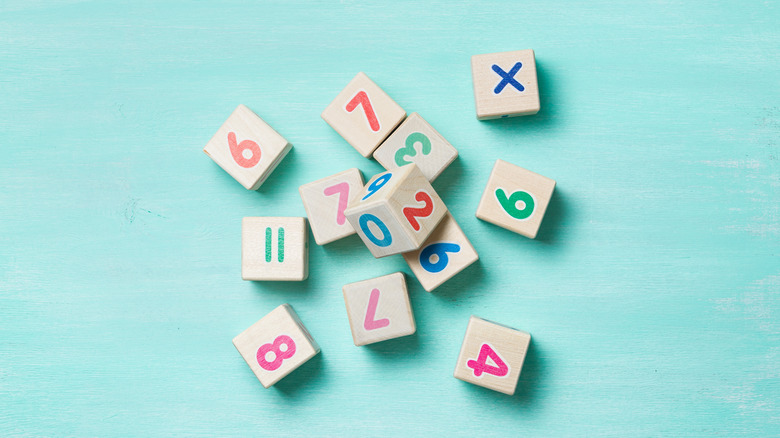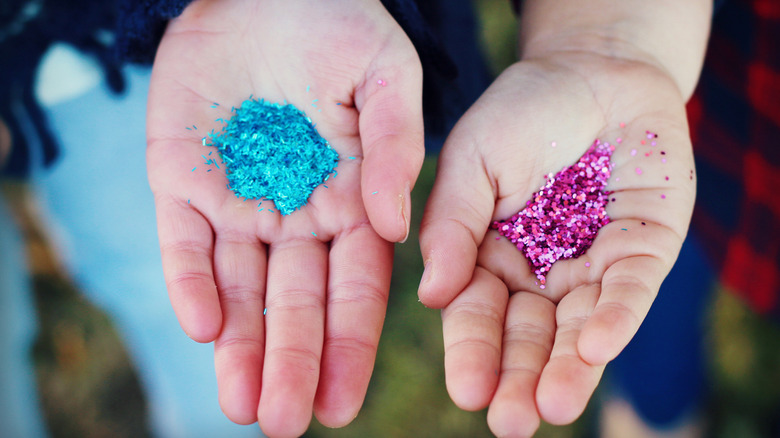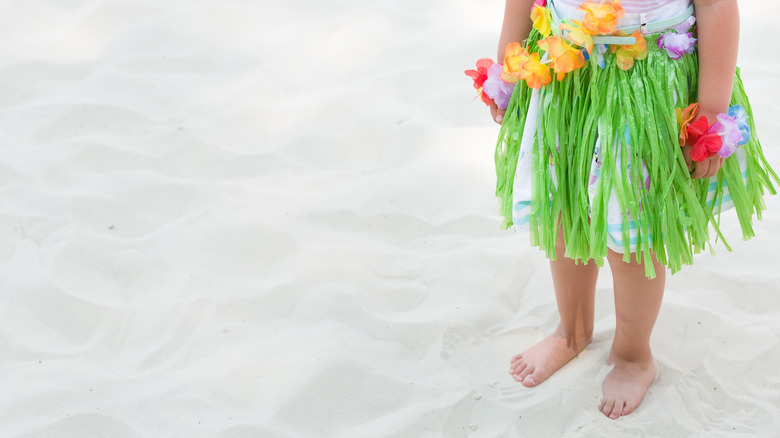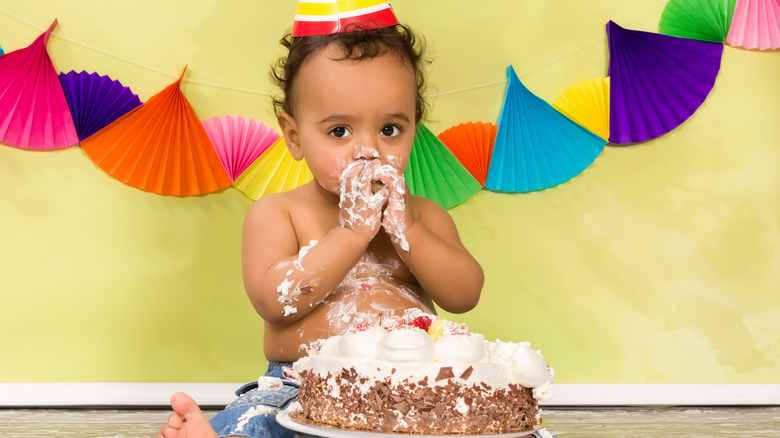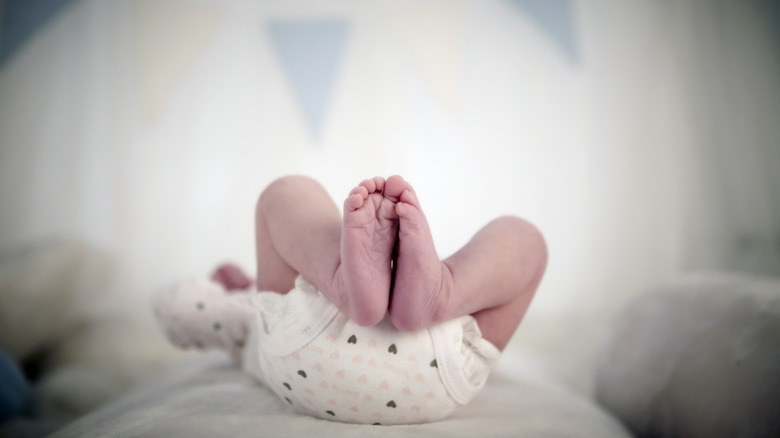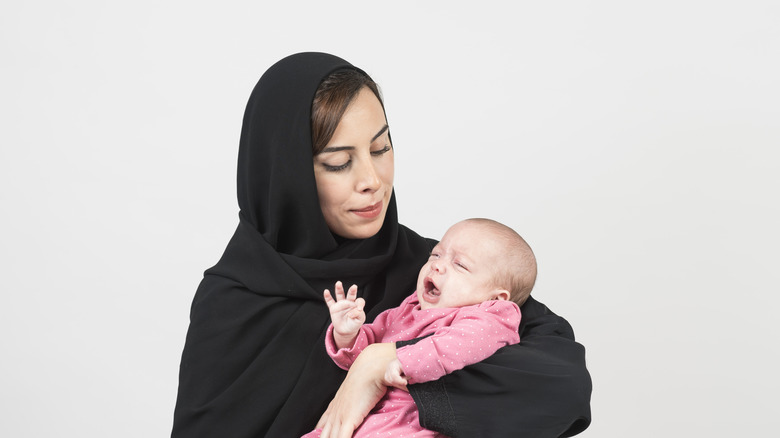Baby Names Banned In Some Countries
Choosing a baby name is a big responsibility and, often times, a very hard decision to make. Many consult baby naming books or scour websites and blogs to find the perfect name while others look to repurpose family names. While the name you choose will eventually reflect on your child, it will reflect on you first — for better or for worse.
Laura Wattenberg, author of The Baby Name Wizard, explained to Parents, "The name doesn't belong to you — you're making the decision because your child can't do it for himself." Still, Wattenberg added one very important caveat, noting that "what you choose does say a lot about your personality."
Sometimes, though, there isn't a whole lot of choosing for parents to do. That's because some foreign governments don't want to leave it up to parents to try them out and decide. In fact, they may have even banned your chosen baby name. Here are some interesting banned baby names and baby-naming laws in other countries.
No numbers in Malaysia
If you're a Bond fan, you might want to choose a baby name that honors the super spy. But if you're in Malaysia, you won't be able to name your newborn 007. According to BBC News, Malaysian authorities came up with a list of "undesirable" names to prevent parents from making the grievous mistake of giving their child a regrettable name. You can't really fault them for their logic. After all, the reason Malaysian authorities published the list was due to an increasing number of citizens applying to change their birth names.
The National Registration Department consulted with delegates from a variety of differing faiths — Muslim, Christian, Taoist, Hindu, and Buddhist — prior to forming the list. Malaysia made the decision to nix any numbers as names, which means 007 is officially out. Nevertheless, Malaysia does allow its citizens the right to appeal. Maybe one lucky, or unlucky, 007 will squeeze through the cracks someday.
The list also prevents parents from using names like Woti, which, in English, translates to sexual intercourse. Oh, boy. Additionally, Malaysian authorities also decided parents would not be able to name their children after colors, animals, bugs, vegetables, or fruits. Good thing Gwyneth Paltrow and Chris Martin didn't live in Malaysia when they had their baby girl, Apple.
Sweden says okay, Google
In a name that looks less like a moniker and more like the result of a cat stomping on a keyboard, Brfxxccxxmnpcccclllmmnprxvclmnckssqlbb11116 is actually a name that has been tried in Sweden, according to BBC News. Fun fact: you can ask Siri to read it, though she will pronounce it incorrectly. The name is not pronounced phonetically (if that's even possible). According to BBC News, it's actually pronounced Albin. Because that makes sense, right?
The parents of prospective Brfxx- — well, you get the idea — used this name as a form of protest against Swedish naming laws back in 1996. Under the law, names have to be approved by authorities before they can be used. If authorities deem the potential name inappropriate, offensive, or otherwise unsuitable, it's out.
That said, somehow the name Google did manage to pass the test as a middle name in 2005, undoubtedly making the parents, search engine expert Elias Kai and his wife Carol, very happy.
Last names as first names? No way in Norway
Norway generally isn't a fan of using last names as first names, so if you live in Norway and you're thinking of a baby name in honor of a familial surname, think again. According to the Name Act, or law on personal name, published by the Lovdata Foundation, parents are not allowed to name their child a name that is traditionally a Norwegian last or middle name.
Unfortunately for Norwegian parents, that means many last names common in Norway — like Hansen, Olsen, and Johansen — are off-limits as first names for their new baby. Exceptions are made if you're an expat or from a different culture, though. Anne Svanevik, a Norwegian name researcher, told the LA Times, "I know a Norwegian family who wanted to name their baby Scott and were refused, while Scott was approved for another family with one British parent."
Despite the odd law, Norway has been dubbed the best place to live in the world for over a decade. The country also ranked as one of the happiest places to live, according to the United Nations' World Happiness Report in 2017. So maybe there's something to this naming policy, after all.
Gender-neutral names are a no in Denmark
Naming a baby isn't exactly a simple task in Denmark. Far be it from the parents to decide what to name their offspring, names are not only controlled by law but they must also be approved by both the Ministry of Ecclesiastical Affairs and the Ministry of Family and Consumer Affairs, according to the New York Times.
Danish authorities reportedly don't want anyone to be burdened by a cruel or ridiculous name and they don't think it's fair for children to grow up being judged for their parents' poor choices. The law was formed when parents named their child Tessa in the 1960s. Tessa was apparently too similar to the Danish word "tisse," which means "to urinate."
Michael Lerche Nielsen, an assistant professor for the Department of Name Research at Copenhagen University and an advisor to Danish authorities, vetoed names he felt would be a disservice to the public. Pluto, Monkey, and Anus — no joke — were just some examples he provided.
The government has also banned last names as first names, similar to Norway, and insists that boys and girls have gender-specific names. Since geographical names aren't gendered, they're generally just rejected. Sorry Chicago and North West, your names would likely be prohibited.
Better stick to the list in Iceland
Welcome to Iceland — a country of less than a half-million residents and whose phonebook categorizes people by only their first names. The Guardian explained that Icelandic last names only designate whether someone is their father's or mother's son or daughter. That's not Iceland's only naming quirk, however.
Excluding those born to foreign parents, all children who are born in Iceland must be submitted to the National Registry within six months time. Parents have the option to either choose a baby name from a list of a little over 3,500 acceptable names — 1,712 male and 1,853 female — or try to get their chosen baby name approved by the Icelandic Naming Committee.
Annually, the committee receives around 100 applications and ends up rejecting roughly 50 percent. One of the biggest reasons for rejection is that Iceland requires all names to be compliant with Icelandic grammar. If a name uses letters outside of the Icelandic alphabet, it won't pass.
"That was the problem with Harriet," Tristan Cardew told The Guardian, "It can't be conjugated in Icelandic." Cardew, who was born in Britain and moved to Iceland, attempted to renew his 10-year-old daughter's passport but the National Registry refused, citing Harriet as an unrecognizable name. The Cardew family had the same problem with son Duncan. Abigail, Veronica, Sydney, Adrian, Chris, and Liam are just a handful of other girl and boy names that have been rejected in Iceland.
Mexico is sick of social media-based baby names
The Mexican state of Sonora has had enough of parents doling out ridiculous names. Before coming up with a list of restrictions and over 60 banned monikers, newborns were leaving hospitals with names like Facebook and Marciana. The latter, which actually sounds quite beautiful in English, translates to "martian" in Spanish.
In Sonora, all social media-based baby names are out. Martian and other extraterrestrial-esque names are also banned, as are medical procedure names. You have to wonder how many children Sonora has already spared from being called Cesarean or Episiotomy.
"The law is very clear," Sonora's Civil Registry director Cristina Ramirez explained to the Associated Press (via Latin Post), "because it prohibits giving children names that are derogatory or that don't have any meaning and that can lead to bullying."
Pre-ban, a couple named their child Juan Calzon, Ramirez confirmed. That is, "Juan Panties." Sounds more like a Nacho Libre character than a real person, but some poor soul in Sonora has the name, and is probably being bullied for it. According to The Guardian, other banned names include Batman, Terminator, and Burger King — because in Sonora, you can't have it your way.
Talula Does The Hula From Hawaii... in New Zealand
New Zealanders have tried to use some pretty out-there baby names. Registrar General Brian Clarke explained to BBC News that New Zealand doesn't allow offensive names or any appellations longer than 100 characters. Imagine trying to learn a 99-character name in preschool, though — yikes!
Kiwi officials will also attempt to reason with parents to prevent children being given embarrassing names. New Zealand has blocked quite a few wild names such as Yeah Detroit, Keenan Got Lucy, and Sex Fruit. What even is a sex fruit? There are more questions than answers when it comes to those names, that's for sure.
Believe it or not, officials have allowed some equally strange names to proceed. Violence, Number 16 Bus Shelter, and Midnight Chardonnay are actual names of actual people in New Zealand. Talula Does The Hula From Hawaii was also bestowed upon a baby in the island country. However, when the child was 9 years old, a judge made her a ward of the court so she could legally change it.
You can't use this US top 100 baby name in Morocco
Sarah was the fifth most popular baby name in the United States back in the year 2000. By 2016, it was still ranking in the top 100, at number 57. Despite its popularity in America, a child would not be permitted to be named Sarah in Morocco.
Sarah is a Hebrew name, not an Arabic one. Citizens in Morocco must, for the most part, pick a name from a designated list of Arabic names, The Huffington Post explained. Be that as it may, if you were looking for a loophole in Morocco, you could name your child Sara (Sarah without the "h") as that is both Arabic and on the approved list. The more you know, right?
The Civil Registry also requires all Moroccan people to choose a first name with "a Moroccan character" — not necessarily an Arabic name, the Human Rights Watch explained. Local authorities, instead, have determined that to mean names must be Arabic-Islamic. This is particularly troubling for Amazigh (or Berber) people, an ethnic group indigenous to Morocco.
One Amazigh couple, in particular, has been fighting for the right to name their daughter the name Yelli, which translates to "my daughter," but the Interior Ministry in Morocco has repeatedly denied their request because the name is not Arabic, according to the Unrepresented Nations and Peoples Organization (UNPO).
Don't make an "irresponsible name choice" in Germany
Contrary to popular belief, parents in Germany are "generally unrestricted" as far as it relates to naming their children. Nevertheless, there are some guidelines. For instance, German parents cannot choose a name that will cause any adverse effects to the child. If a parent does pick a detrimental name, the government has the right to intervene and protect the child from an "irresponsible name choice."
Here's where it gets a little tricky. While Germany may be pretty free-spirited when it comes to naming babies, the German Personal Status Act has some regulations of its own. One requirement is that when a German citizen has a child, he or she must register both the name and gender of said child. Per the instructions adopted by the Ministry of Interior, gender-neutral names aren't allowed; male children must have male names and female children must, likewise, have female names.
Oddly enough, the one exception is the name "Maria." If you want, you can give your son the middle name Maria in Germany. Additionally, no last names can be used as first names, which means neither Anderson, Cooper, nor Anderson Cooper, would fly in Deutschland. If a name is rejected, parents have the option to take the matter to court and appeal the decision. At least you don't have to pick from a list, right? Silver linings.
A baby named Linda? Not in Saudi Arabia
Saudi Arabia isn't known for being the most liberal of nations so it isn't too shocking that some baby names are off limits in the country. The Saudi Gazette published 51 new banned names back in 2014. According to the article, the Civil Status Department explained that some names did not fall in line with "social traditions" whereas other names were deemed inappropriate "in terms of religion."
One banned religious name is Basmala. The Washington Post pointed out the name translates to "in the name of God" and would easily be understood by Arabic-speaking people. Gregory Gause, a professor at the University of Vermont who studies Saudi Arabia, explained further, "It's part of a broader crackdown on everything."
Part of the crackdown also involved Saudi officials banning a few names of "Western origin." That means Saudi parents can no longer choose the names Sandi, Laureen, Aileen, or even Linda — the trendiest name in the history of the United States.
